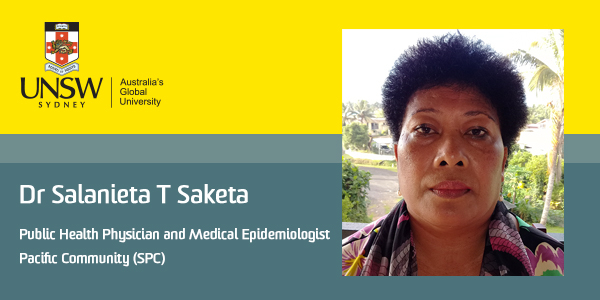Login with your zID and zPass
Any problems email servicedesk@unsw.edu.au

Emerging and re-emerging infectious diseases pose significant threats to human health and security for small island nations in the Pacific. Determinants of infectious disease emergence and re-emergence are numerous and can be broadly categorized into the microbial agent-related factors, the human-adapted agents and the human environment including climate, weather and changing ecosystems.
In the recent past, Pacific Island Countries and Territories has seen outbreaks of emerging and re-emerging diseases, most of these are of zoonotic origin. The regional Epidemic and Intelligence System of the Pacific Community, together with the national and regional syndromic surveillance systems of the Pacific Public Health Surveillance Network has noted an unprecedented wave of arbovirus diseases, including emergence of Zika and Chikungunya infections. Diarrhoea due to rotavirus and Hepatitis A are increasing over time. Prevention and control of these infectious diseases will not only require expertise on epidemiology, surveillance and disease management but also changes in human behaviour and an enabling environment both at the national and regional levels. A concerted strategy on infectious diseases that cuts across relevant sectors driven by enhanced surveillance, rapid and prompt response, partnership building and collaboration, complemented with a robust research and monitoring and evaluation component to guide policy development is a must.
Dr Sala MBBS, MPH, MBA is a public health physician and medical epidemiologist with over 20 years’ experience working in the Fiji public health system serving at various levels and rising to the position of Permanent Secretary for Health from 2009-2011. For the past five years she has been serving 22 Pacific island countries territories under the Pacific Community (SPC) in strengthening public health surveillance through the Pacific Public Health Surveillance Network (PPHSN).